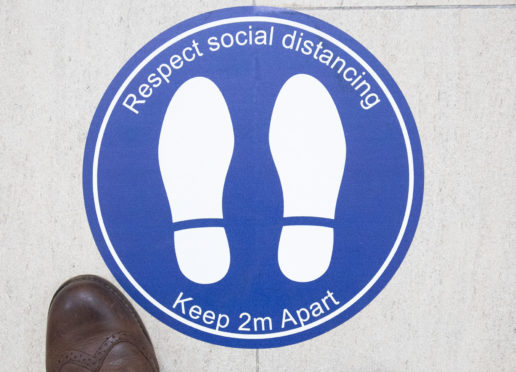
New research has shown that people with mental health problems have seen their wellbeing and support deteriorate due to the challenges of the pandemic.
As the one year anniversary of lockdown is marked, the latest report by SAMH (Scottish Association for Mental Health) has revealed the devastating impact on people and services.
The experiences of over 1,000 people with existing mental health problems were gathered through three surveys and a series of 15 in-depth interviews from across Scotland between August and December.
Over half (56%) of participants in the SAMH’s final survey in November felt their mental health had worsened recently, compared with the start of the pandemic.
They also felt they could not rely on getting the support required. While the majority (64%) of participants tried to speak to their GP about their mental health during the pandemic, 1 in 10 (13%) were unsuccessful.
And over a quarter (27%) of respondents to the final survey said their specialist treatment or care had stopped entirely because of the pandemic.
The move away from face to face appointments was isolating for some people, and for many, it meant an inconsistent offering of mental health support, or a complete pause, at a time when they needed help the most.
Hayley Mathieson, 36, from Dunfermline, was one of the participants in the research. She has experienced mental health problems for a number of years, and her struggles to get support began soon after the first lockdown.
She explained: “Before lockdown I was taking part in 10 week group therapy programme, which I found helpful. I missed week 8 because I had cold symptoms and by week 9 we were in lockdown, we got a letter saying services had been suspended and the way it was worded made it feel like you were very much alone, it felt like a gut punch.
“After chasing my appointments I have managed to see my psychiatrist. Because of the type of medication I’m on, I’m supposed to have appointments every 3 months and that’s not happened throughout the pandemic. I can’t get my medication through my GP and sometimes it’s been hard to get in touch with the psychiatrist, at times I ran out of my prescription.”
Hayley said she felt like contacting NHS staff had “felt impossible”.
She added: “I feel like I’ve been hit by a tidal wave trying to figure it out which way I’m being swept. I’m grateful that I do have some coping skills from therapy and I’m undergoing treatment because I imagine it’s really hard to make that first step.”
The research also found that the pandemic itself has knocked people’s confidence in accessing support. People reported feeling like a burden and anxious about adding to the pressure of the health service by asking for help and support.
Billy Watson, SAMH Chief Executive, said: “As we come to the one year anniversary of the first lockdown, it’s clear that more must be done to ensure people struggling with mental health problems are not forgotten. Today’s findings show that the coronavirus pandemic has hit people with mental health problems hard, and the experiences they have shared with us as part of this research must be recognised.
“But coronavirus was not the sole cause of the mental health crisis in Scotland. Services were already struggling prior to the pandemic. We must now see face to face support return as soon as it’s safe to do so. And as we move out of restrictions, better support and care must be made an absolute priority.”

Enjoy the convenience of having The Sunday Post delivered as a digital ePaper straight to your smartphone, tablet or computer.
Subscribe for only £5.49 a month and enjoy all the benefits of the printed paper as a digital replica.
Subscribe
